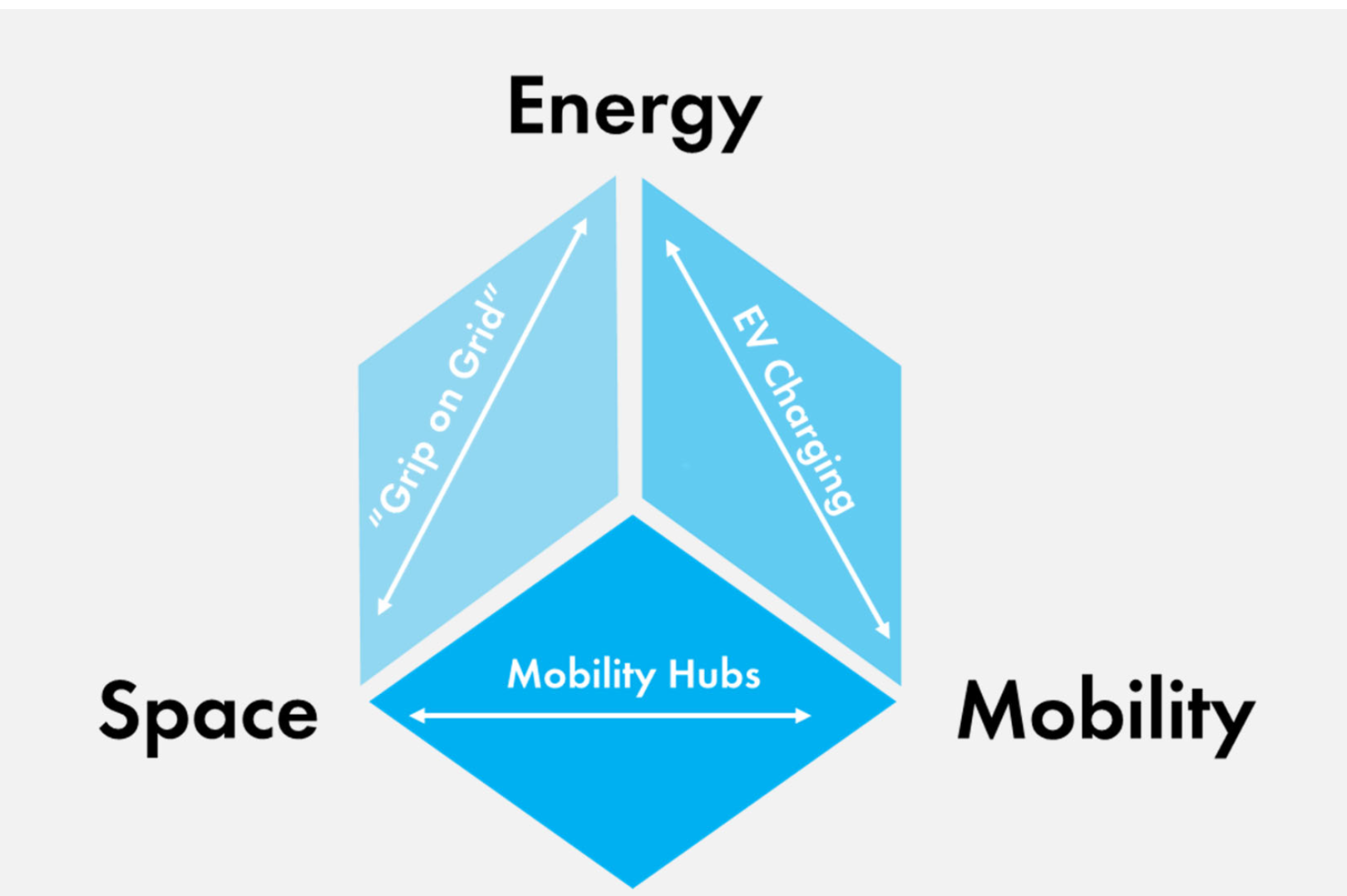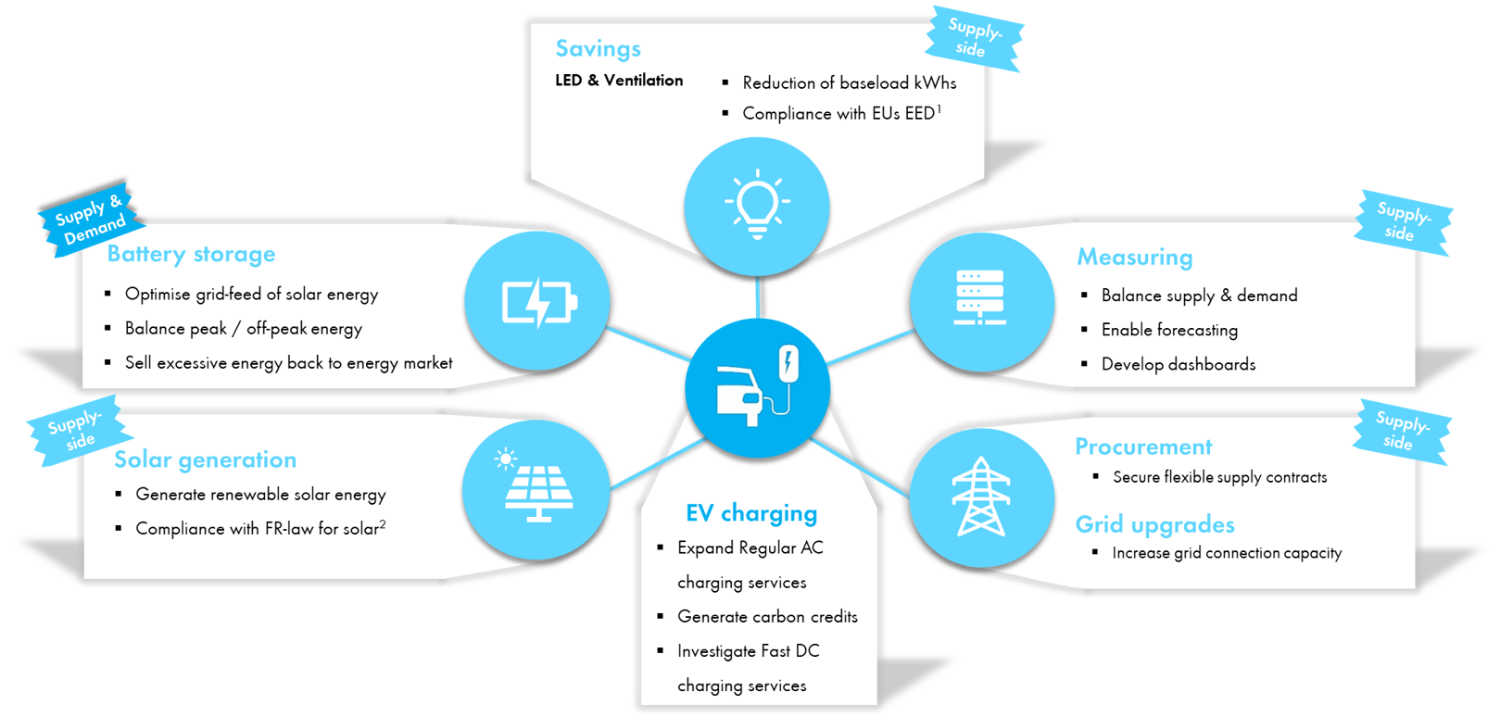Energy Management
With many parking facilities at strategic urban locations, Q-Park plays a key role in facilitating EV charging for customers. The increasing numbers of full electric (BEV) and plug-in hybrid (PHEV) vehicles in car fleets are accelerating demand for charging infrastructure.
Upgrading our electricity supply to meet EV charging needs is a considerable challenge. One of the limiting factors is the grid capacity when planning additional EV charging points in our car parks. Expanding the number of EV charging points in our parking facilities is part of our business plan, but the energy transition is causing grid lock in many major European cities.
Our Energy Portfolio Management builds on the EV Charging Programme we launched in 2021. For our 2023 results, please visit the EV charging section in this report.
New opportunities
In 2023 we developed an energy roadmap, in which we implement technology & deploy resources to secure energy supply and reduce grid dependency.
Proof of concept
The Energy Hub as a concept is already live as a parking facility which includes solar panels, battery storage, EV charging (both AC & DC). This concept is scalable to other above-ground parking facilities, all part of our Energy Portfolio Management.
Developing 3D synergy
We have parking facilities at key locations in city centres and at ring-road hubs. Across our portfolio, we have identified some 140 parking facilities with exposed roof tops which are potentially suitable for solar and/or wind power generation.
Synergy arises where we can take advantage of space, energy and customer mobility:
Grip on grid
EV charging
Mobility hubs
Figure 14 3D synergy model

Supply and demand
We have developed an energy roadmap to help us achieve our net zero ambition by 2040. On the demand side, we sell energy to our customers as they charge their cars while parking. On the supply side, we want to procure, generate and manage the energy we need more effectively. Furthermore, there is a business case for Q-Park as well as for our stakeholders:
Parking customers
Municipalities, Societies & Landlords
Shareholders & Investors
We have identified building blocks for the demand side and supply side in our business operations. The demand side mainly consists of EV charging and in some parking facilities where we have solar panels and/or wind turbines to generate our own power, topping battery storage during off-peak hours counts as demand too.
On the supply side, we have been taking measures to reduce our energy consumption. Measures taken to reduce our baseload include installing LED lighting and, at the design stage, making a conscious choice to use natural rather than mechanical ventilation wherever possible. These measures also help us comply with the EU’s Energy Efficiency Directive (EED).
To measure our energy savings, we are developing dashboards to help us balance supply and demand and enable us to forecast our energy needs. We are working with suppliers to secure a flexible supply of renewable energy and were appropriate, we apply for grid upgrades to meet EV charging needs.
We have also identified a number of above-ground parking facilities where we can generate renewable solar energy by means of solar panels.
Figure 15 Energy portfolio management building blocks

EV charging market
The EV charging market consists mainly of customers wanting to charge their vehicle when they arrive at their destination so they have recharged sufficiently for their next journey. Destination charging forms 85 to 90% of the market, customers charge at work, at a retail or leisure destination and at home.
According to a study conducted in the Netherlands by GFK1 during 2023, Q-Park is ideally positioned to capture destination charging. Q-Park is present and expanding in key west European cities where we have more than 706,000 parking spaces generating more than 100 million parking transactions annually.
Empower the future
Figure 16 Energy roadmap to 2030

We are developing initiatives to meet the growing demand for sustainable energy to power our expanding EV charging infrastructure. We are also working on energy storage systems to store electricity generated by solar installations for use at a later point in time.
We have appointed an Energy Portfolio Manager to oversee our energy related efforts which will:
enable Q-Park to take advantage of a wide range of valuable opportunities;
require investment and gathering new expertise;
have a long-term perspective, revenue generated from initial investment can be reinvested;
confirm our strategy with proof points and present new initiatives with credible and legitimate potential.
- Study has been conducted in NL via online interviews by GfK; n=501 (301 EV-owners + 200 EV-intenders)
